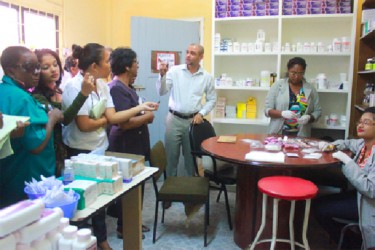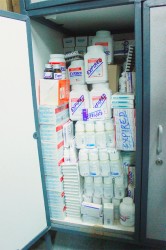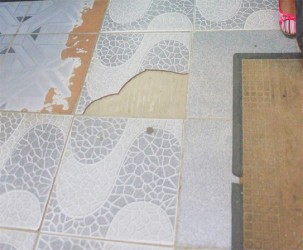By Shakisa Harvey
Representatives of the Parlia-mentary Sectoral Committee on Social Services yesterday gave the East Demerara Regional Hospital—commonly referred to as the Diamond Diagnostic Centre—an 80% rating and stated that they were pleased with the condition of the facility.
However, Head of the Committee Indranie Chandarpal recommended a facelift and improved management to bring the hospital up to where it should be.
She stated that while most of the issues stemmed from shortcomings of the Regional Democratic Council (RDC), there are still initiatives the hospital management can undertake to bring it to near perfection.

One such initiative, Chandarpal suggested, was planting attractive trees in the compound and the replacement of tiles and seats in the various waiting areas to create a good first impression from the moment patients enter the facility. She said too that upkeep of the premises and the rooms is crucial.
The hospital was applauded for making use of its own initiative to depict its “own persona and administrative skills”.
Chandarpal encouraged the staff to continue to think outside the box and “to walk the extra mile” to do what they think is required.
“The Ministry of Health will never be able to provide all the things that are required because it is so much. Also, while you are building new institutions there is the problem of maintenance and that is why we need the support of doctors to think out of the box, and also the support of organisations like Food for the Poor,” Chandarpal explained.
The institution, which has 12 doctors (five of whom are Guyanese) inclusive of an Intensive Care Unit (ICU) specialist, an internal medicine specialist, an ophthalmologist and a dentist, has been in existence for about seven years.
Some of the Cuban doctors and other employees at the hospital were away yesterday observing Revolution Day, (one of Cuba’s largest national holidays). Those who remained were observed cleaning the ICU, said to be a norm on not so busy days.
Positives

The tour, chaperoned by Director Kevin Mana, began with a visit to the waiting room which functions under a 24 hours triage system with a single nurse. When asked how long a patient might have to wait to receive medical attention, Mana said it depends on the nature of the case.
He said that at present the RDC has been delinquent for about three months in getting triage forms for the hospital and this has been hampering efficiency. These forms facilitate an assessment of patients to determine whether they have to be treated at the out-patient clinic or if their cases are severe.
Neatly stacked and laundered linens, donated by Food for the Poor were observed in the clean-smelling laundry room. The only challenge, Mana said, is the defective dryer, which poses a difficulty during the rainy season.
An examination of the emergency room and emergency delivery room revealed that they are in good working order, with all the equipment and medication provided. Some of the beds therein were also donated by Food for the Poor.
Where the disposal of bio-medical waste is concerned, Mana told the team that the hospital is able to effectively utilise the hydroclave biomedical waste system of the Georgetown Public Hospital (GPH).
A look at the pharmacy revealed that the staff had mastered the art of pre-packing and is seldom out of medication. According to Mana, the only time a shortage occurs is when the Ministry of Health’s Materials Manage-ment Unit (MMU) is out of stock. On a busy day, Mana said, a patient might spend just 2-3 minutes at the pharmacy, which exercises careful dispensation of medication, for which clinic cards must be shown. Prescriptions from other institutions must be endorsed, he continued.

The eye-clinic appeared to be good order and Stabroek News learnt that it sees over 20 persons a day. Major challenges include procuring lenses for the eye test machines and security to deal with belligerent patients who get impatient if they have to wait for over half an hour.
The hospital sees a high number of patients from Region 3, according to Mana, who credits this to the improved malaria treatment it offers.
The hospital has 20 nurses, who said they love what they do, which Chandarpal noted is important to a high level of productivity and efficiency.
The hospital has no paediatrician.
Negatives
The hospital has been operating without an ambulance since February 2011. The one it had, courtesy of the Guyana Bank for Trade and Industry, was involved in an accident and has been in the workshop for repair since.
Mana said they have been using an ambulance from Davis Memorial Hospital on a service contract at a cost of $8,500 per trip, which “does not make economic sense”.
Among his concerns was the fact that the facility has been forced to keep expired drugs—which accumulate quickly over time—for the past five years because of a lack of a proper disposal system.
He said this situation occurs because Food for the Poor tends to donate items with short expiry dates, which is a problem in every facility.
He said the hospital, which has served over 8,000 patients to date, is in need of additional personnel, inclusive of porters, records clerk, ambulance driver, another handyman and another laundress.

A talk with the dentist revealed that his machine for extraction had been out of service for about six weeks so he is only able to do filling and cleaning.
Mana explained that the servicing of medical equipment is handled by the Ministry of Health. Typically, when an issue is reported, there is usually a protracted period for evaluation, he said. Because of this, the dental clinic, which sees about 20 patients per day, has not been able to operate at its optimum level.
The laboratory’s bio-chemistry machine and analyser also need fixing, the five fire extinguishers are in need of testing and installation and fire-proof filing cabinets are required to aid improved record-keeping, he said.
A doctor shared that more wings with beds are needed because sometimes maternity patients are mixed with other patients.
The doctor said too that security is a major problem as there are often cases where doctors are harassed and threatened by patients to the point where it gets beyond the control of the guards. She opined that a police outpost at the hospital would be more fitting.
After the tour, in a meeting with Chandarpal, Mana elaborated that there were incidents where doctors were stalked and assaulted. Offenders were charged and there were three successful convictions, he continued. Mana said the issue was taken several months ago to the Ministry of Home Affairs and an Inspector Grant was mandated to investigate the possibility of setting up a mobile station at the hospital.
Pointing to the need for a social worker, he said there are cases involving the abuse of young children, where the police refuse to get involved because they claim it is the responsibility of the Ministry of Human Services. Chandarpal advised Mana to consult the Child Care and Protection Agency.
She also proposed a management board as she said leadership is crucial in producing favourable outcomes, whether through a highly-motivated staff or satisfied patients. For instance, she said, she noticed that the nurses, though trained, lack guidance and are in need of a mentor.
Meanwhile, patients in the waiting areas said they were pleased at the quality of service the hospital provides. Sheliza Cox, who has been using the services of the hospital since its opening, said she had no complaints and commended the institution for maintaining its standards.
The general consensus among other patients was that they received attention quickly; the doctors are friendly and the overall service good, compared to the GPH. Many said the language barrier was not a problem as most doctors understand them and sometimes persons are there to translate.
Mana was informed that the hospital’s progress will be inspected in October when the team plans to visit again.




